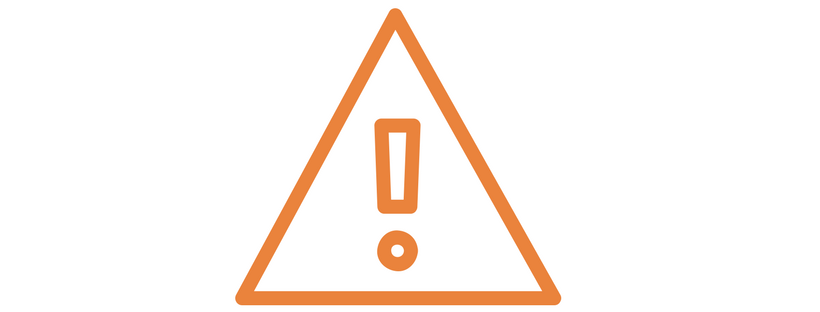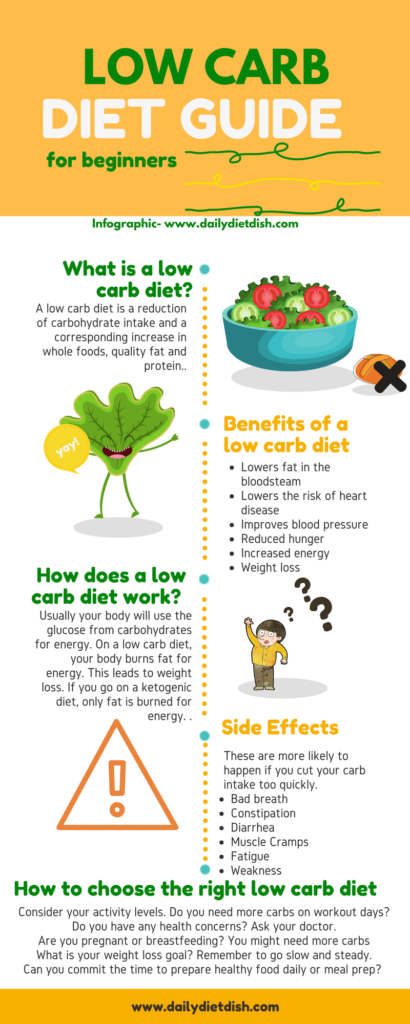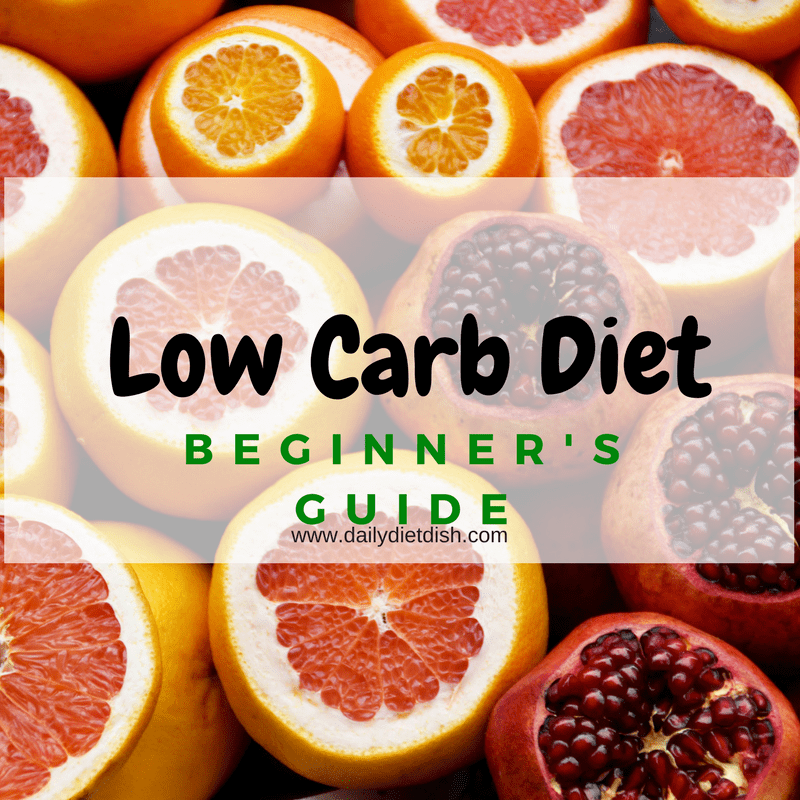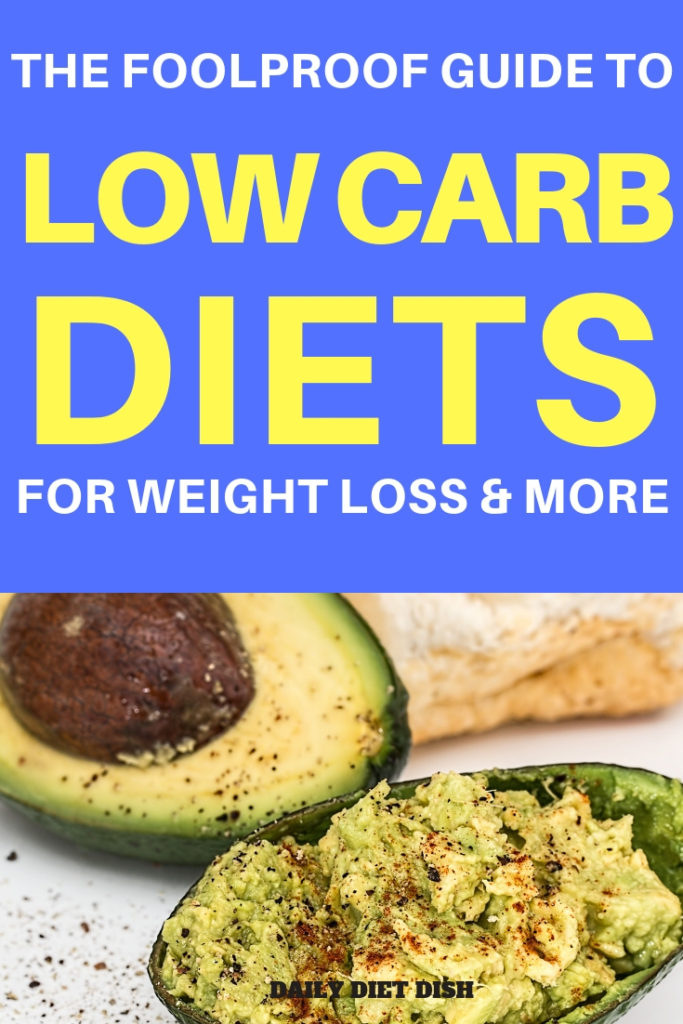By doing this, you are able to make better use of the fat that is already stored (accelerating weight loss) and metabolizing the fat that you eat much faster.
Ok, that sounds like a lot of science but I promise that it’s not. Let’s take a look at what a low carb diet is all about, the many benefits, and how you can start one.
What is a Low Carb Diet?
A low carb diet (short for low carbohydrate diet) is a reduction of carb-rich foods and a corresponding increase in whole foods, quality fat, and (sometimes) protein.
A basic low carb diet can be started by cutting out refined or processed carbs such as sugar, bread, pasta, flour, and rice. These items are replaced with complex, fiber-rich carbohydrates that serve to keep you full and help you to eat less.
A low carbohydrate diet, while low in refined carbs, contains a higher amount of vegetables, fruits, healthy fat, and protein. There are many reasons to go on this diet. Let’s look at a few of them below.
Benefits of a Low Carb Diet
There is a lot of evidence that low carb diets can help people to lose weight[1]. There are some other major benefits, such as:
- Lowers fat in the bloodstream
- Lowers the risk of heart disease
- Improves blood pressure
- Reduced hunger
- Increased energy
- Better control over insulin
So How do Low Carb Diets Work?
Our bodies gain energy by breaking down the carbohydrates from food to form a simple sugar called glucose. Because it is the easiest form of food to turn into energy, it is the body’s first choice and so when you eat fat it’s normally stored.
When a person’s carbohydrate intake decreases, so will the body’s level of glucose. This may sound unhealthy, but the body is smart so it turns to fat to burn energy instead. The fat is broken down in the liver and is turned into ketones. These are a great energy source for the brain and the body.
When someone intentionally lowers their carb intake to less than 20 grams per day, their body goes into ketosis. In this state, they use fat almost exclusively as their energy source. This diet is a form of low carb diet. It is called the keto or ketogenic diet.
What to Eat on a Low Carb Diet
There are many food options that you can choose from if you choose to go on a low carb diet. I’ve compiled a list of 101 low carb foods that you can refer to when you’re making your shopping list.
Here is a quick look at some of the best low carb foods: (click here for the full list)
Best Low Carb Fruits
- Blackberries
- Melon
- Cucumber
- Raspberries
- Avocado
Best Low Carb Vegetables
- Cauliflower
- Broccoli
- Cabbage
- Zucchini
- Squash Mushrooms
Best Low Carb Snacks
Best Low Carb Sweeteners
No doubt the biggest problem that most of us have when we go on a low carb diet! Read more about the best low carb sweeteners to use so you can continue to satisfy your sweet tooth!
Other Low Carb Foods
Depending on the type of low carb diet that you choose ( regular low carb or keto), you’ll be able to eat the regular meats, seafood, dairy, and fats.
If you want to get quick low carb recipes, there are some awesome low carb cookbooks that you can try. They are also super convenient because you won’t have to spend time counting macros.
If you do want to count your macros and find out how many carbs you should eat, here’s a handy low carb diet calculator. (It’s free to use and it’s perfect for the keto diet!)
Now that you have an idea of what you’ll eat on a low carb diet, here are some more details on what goes on when you start.
What Happens to Your Body on a Low Carb Diet

As we explained above, lowering your carb intake causes a couple of things to happen in your body.
#1 Your sugar cravings will decrease
Sugar does not have a good effect on the body. Not only does it contribute to cravings, it causes fatigue and anxiety. By eating whole foods, vegetables, and natural sources of fat and protein, you will reduce this. Your brain, which craves a steady supply of fat to perform daily, will start to get its energy from more wholesome sources.
#2 Your focus will increase
As an extension of the first point, with less sugar in your bloodstream, you will experience less fatigue. It’s that feeling like you just want to crash in the middle of the day.
When you decrease carbs and increase your fat and protein, you won’t experience the high-and-low energy cycle that a high carb diet brings. You will have a steady focus throughout the day.
#3 You will burn more fat
We mentioned earlier that eating less carbs causes your body to use more fat for energy. This results in burning stored fat that will lead to weight loss.
Side Effects of a Low Carb Diet
While the benefits are unquestionable, there are a few temporary side effects that you may experience if you cut carbs suddenly. Some of them include:
- Constipation
- Fatigue
- Diarrhea
- Weakness
- Muscle cramps
- Bad breath
You can reduce these side effects by gradually decreasing the amount of carbs you eat. It is also very important to drink a lot of water. The recommended water intake for adults in 1-2 liters per day.
For constipation, ensure that you are eating a lot of fresh veggies, fruits, and whole grains. These foods are rich in fiber and will help to alleviate this.
For diarrhea, ensure that you drink enough water and eat more salt to increase the electrolytes you have lost.
If you experience bad breath, a sugar-free breath mint should do the trick. You can also brush your teeth a couple times per day.
How to Choose the Right Type of Low Carb Diet
There are different levels of low carb diets that you can choose based on your goals and lifestyle. On a mild or regular diet, you can simply stop eating refined foods and replace them with whole foods. You can gradually reduce your carbs from there to a level that you are comfortable with. A low carb diet does not mean a low-calorie diet.
As you decrease your carb intake, you may decide to eat less than 20 grams of carbohydrates per day. This is known as the ketogenic diet.
Here are some things to consider when deciding to go on a low carb diet:
- Your level of activity
- How much time you have to prepare food
- Any health concerns that require you to consume a certain amount of carbohydrates
- If you are pregnant or breastfeeding
- Your weight loss goals
No matter what level of low carb you choose, it’s really important to eat quality foods that are nutrient dense. Nutrient-dense foods are rich in vitamins and minerals, and these sustain your body.
Also, note that low carb does not mean low calorie. On a low carb diet, you eat a small amount of carbohydrates along with increased fat and adequate protein to keep you satisfied. On a low-calorie diet, your overall food intake decreases. Many times, this form of dieting is not sustainable.
Low Carb Diet and Weight Loss
Low carb diets are very beneficial to long-term weight loss. On this diet, you can lose weight even without exercise, simply because you are eating better food. The most important thing to note on a low carb diet is that your serving size is very important. Look at the labels of foods and consume carb-rich foods and snacks in moderation.
To maximize your success, eat until you are full, instead of counting calories. If you find yourself getting hungry between meals, here are some easy low carb snacks that you can prepare in less than five minutes.
Top 5 Mistakes to Avoid

It’s easy to get excited about making decisions that will help us to achieve our goals faster. Going all in on a diet that promises to help us to shed pounds seems like the most obvious thing to do. But it’s not, and it can seriously affect you negatively if you cut carbs too fast.
Some top mistakes that people make when going on a low carb diet include:
- Cutting carbs too quickly- Your body needs time to catch up with your brain. For most healthy people, a good place to start is to cut out refined foods and replace them with whole grains. You can then reduce the overall amount of carbs that you consume over a couple of weeks.
- Eating too much protein- It’s easy to assume that less carbs automatically means a lot of protein. This is not the case. Yes, you will eat the adequate amount of protein that you need to get full. However, eating too much protein give your body the opportunity to turn this extra protein into glucose. This defeats the purpose of the entire diet.
- Not choosing the right types of foods- Eat fruits, vegetables, protein and fat sources from wholesome sources. Ensure that you get vitamins and minerals from your food, and not just macronutrients such as protein, carbs and fat.
- Not enough carbs to support an active lifestyle- If you have a more sedentary lifestyle where you don’t work out a lot, you will need fewer carbs than the person who works out every single day. You can also choose to increase your carb intake on the days that you will work out to ensure that you are not consuming too many carbs on the days that you don’t. Gradually decreasing carbs while going about your daily activities will help you to find that sweet spot.
Low Carb Diet Infographic

Recap
Going on a low carb diet is beneficial and sustainable for short term and long term weight loss. Aside from helping you to lose weight, it can increase your focus and improve your energy levels through the day.
However, eating this type of diet has side effects such as constipation and fatigue. This can be easily taken care of by drinking water and eating enough fiber.
It’s also important to eat enough protein, but not too much. This is because high levels of protein can be turned into glucose, which is the same thing that happens to regular carbohydrates.
We really hoped that this article helped you to figure out what goes on with a low carb diet. Please note that this article is not to be taken as medical advice. We only aim to keep you informed.
Sources
- Effect of low carb weight loss diet on exercise capacity in obese subjects
- Effects of Short-Term Carbohydrate Restrictive and Conventional Hypoenergetic Diets and Resistance Training on Strength Gains and Muscle Thickness.
- The low-carbohydrate diet and cardiovascular risk factors: Evidence from epidemiologic studies
- Low carb vs low fat effect on metabolism


